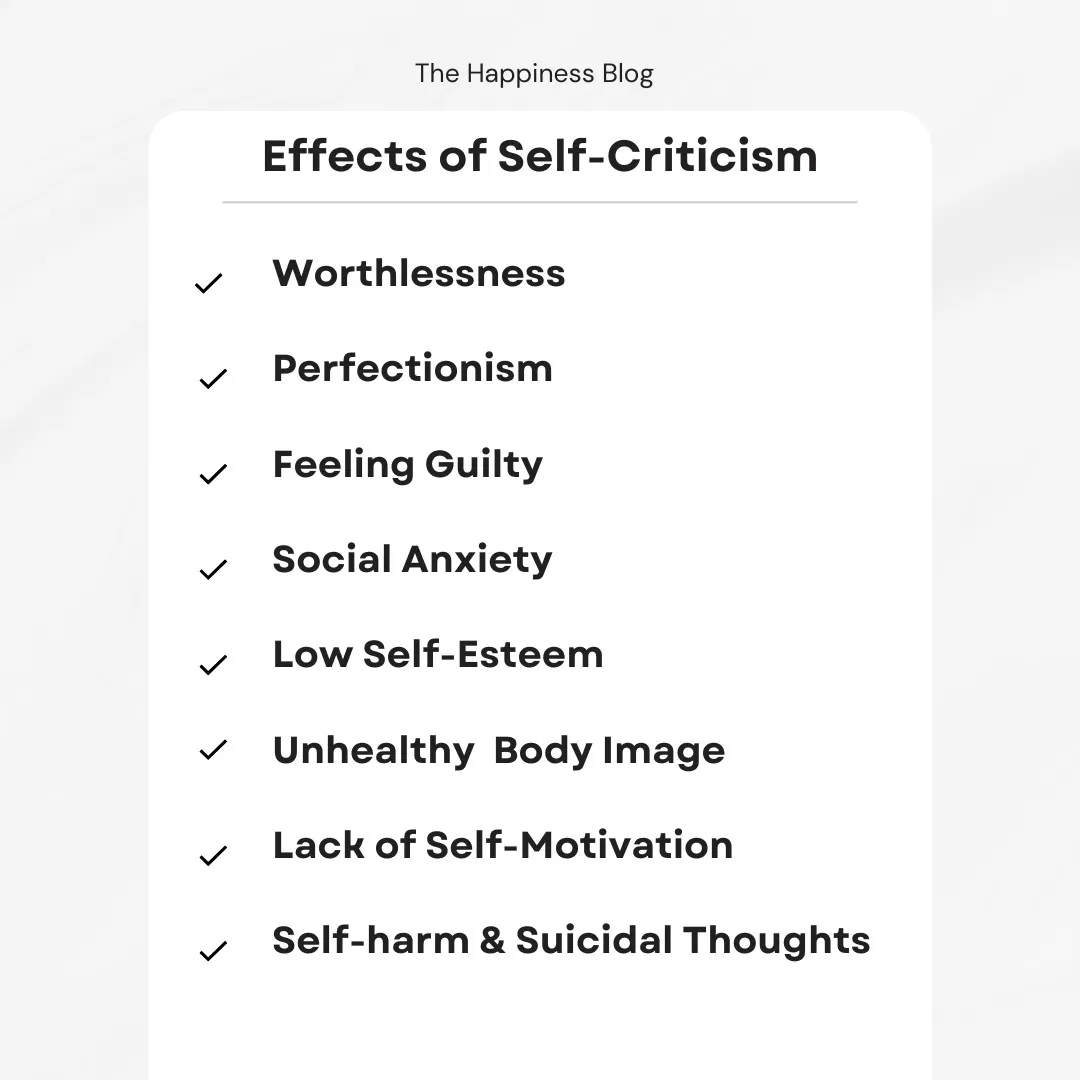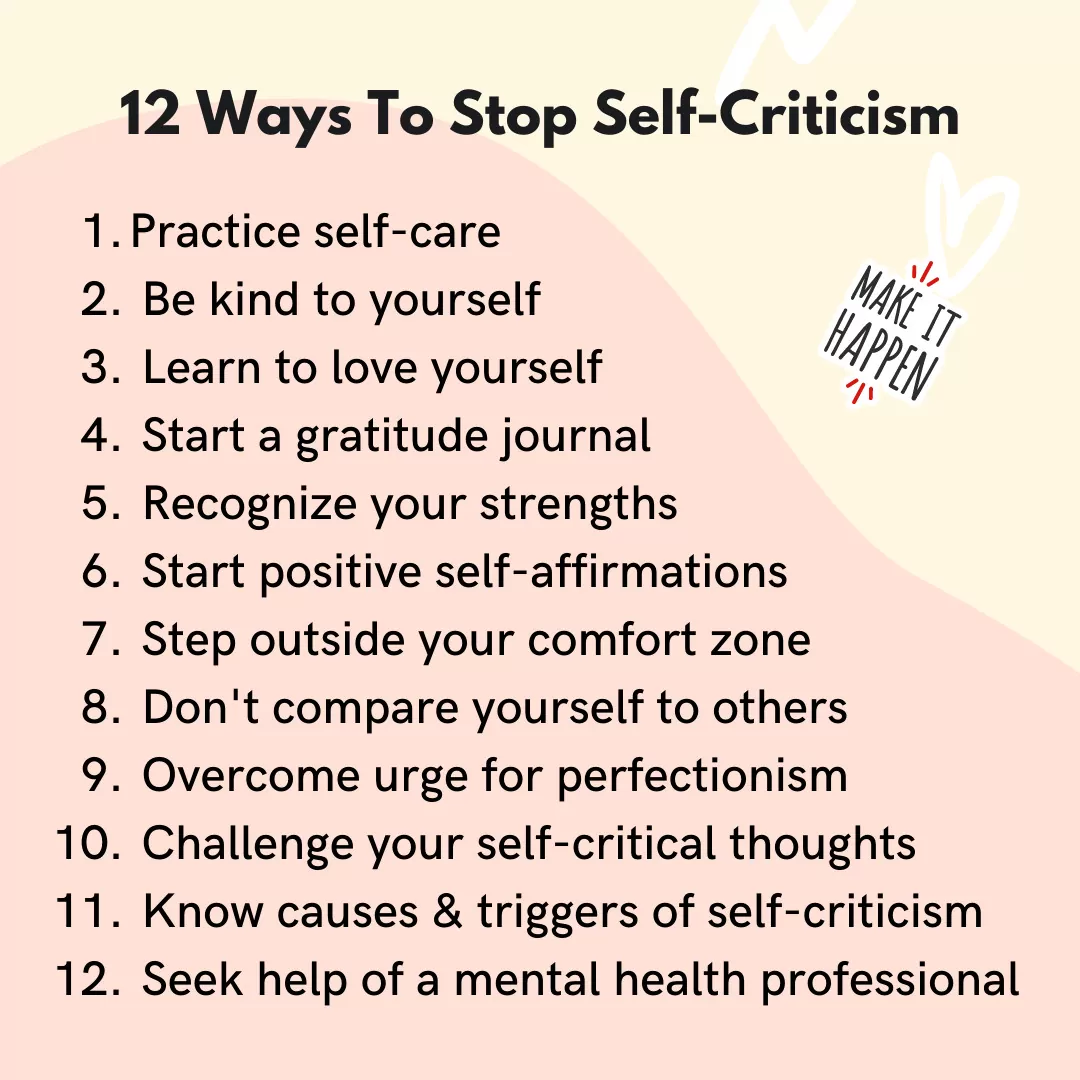Today's Monday • 15 mins read
“We are harder on ourselves than we are on anyone else.”
― Anne Burton
In 2005, Steve Jobs gave Stanford freshmen this life-changing advice: “Your time is limited, so don’t waste it living someone else’s life.”
He saw where young people go wrong: they stop wanting to be themselves and instead try becoming someone else.
They absorb criticism from others and translate it into self-criticism.
Self-criticism turns you against yourself. It makes you stop liking who you are. Like poison, it suffocates everything that you love about yourself and smothers your zest for life.
Listen to the last 3 minutes of Jobs’ speech — it may change your life.
What do you mean by self-criticism?
Self-criticism means critical evaluation of one’s own actions, thoughts, and habits. It is an act of self-reflection that allows us to see ourselves, and our work, with objectivity. It helps us recognize our weaknesses so that we can overcome them and make fewer mistakes in the future.
Self-criticism is the tendency to frequently engage in negative self-evaluations regarding standards and expectations, including harsh, chronic self-disapproval, in conjunction with a fear of disapproval from others (Blatt, S. J., 2004).
Self-critical people appear to be less agreeable and less extroverted (Zuroff, 1994). They also appear to be more hostile and distrustful of others (Zuroff & Fitzpatrick, 1995).
According to Thompson and Zuroff, there are two types of self-criticism:
1. Comparative Self-Criticism (CSC)
Comparative self-criticism (CSC) is defined as a negative view of the self in comparison with others.
People with CSC compare themselves negatively to those they see as superior, hostile, or critical. This makes them nervous about being evaluated by or exposed to others.
One aspect of CSC is interpersonal hostility. People with CSC cannot trust others they see as hostile and demanding. As a result, they either take care to keep themselves from meeting them or aim to dominate them.
2. Internalized Self-Criticism (ISC)
Internalized self-criticism (ISC) is defined as a negative view of oneself in comparison to internal, personal standards.
People with ISC are not bothered by the opinions of others and do not judge themselves based on what others think of them.
They compare themselves with an idealized version of themselves, not with others. However, their standards for themselves are so high and so distant that they constantly fail to meet their own expectations.
What is good self-criticism?
Good self-criticism is the healthy and helpful process of assessing and evaluating one’s own work through objective standards.
Good self-criticism is when you criticize yourself fairly.
It is a way to review our work for what it really is and then analyze how to improve it. Helpful self-criticism allows us to take responsibility for our actions, learn from our mistakes, and have a growth mindset.
Good self-criticism creates a strong, positive mindset, leading to high levels of joy and life satisfaction.
What is toxic self-criticism?
Toxic self-criticism is when you constantly criticize your mistakes and shortcomings. It is your harsh and callous attitude toward yourself.
Toxic self-criticism is when you criticize yourself unfairly.
Toxic self-criticism creates a negative mindset, leading to discontentment and distress.
What causes self-criticism?
Where does self-criticism come from?
Studies show the tendency to self-criticize may be caused by low self-esteem, deep-rooted insecurities, avoidant attachment, and an attitude of perfectionism.
1. Avoidance Coping Mechanism
Researchers have found chronic self-criticism to be a strong predictor of an avoidance coping mechanism. That is, self-critical people mostly like to avoid stress.
2. Avoidant & Insecure Attachment Styles
Self-criticism is also linked to avoidant attachment style. Such people avoid intimacy, which prevents them from practicing self-compassion.
Insecure attachment styles are also often associated with self-criticism.
3. Internalization of Shame Experiences
Humiliated people may internalize their shame experience, which can lead to the development of self-criticism as a defense mechanism.
4. Low Self-Esteem
Low self-esteem is defined as a global negative appraisal and attitude of the self (Rosenberg et al. 1995). Researchers have found a correlation between low self-esteem and high self-criticism.
5. Perfectionism
Perfectionists often suffer from self-criticism. Such people tend to react to stressful events with high emotions, self-blame, escape fantasies, and weak attempts at problem-solving.
What are the effects of self-criticism?
Some of the most common effects of self-criticism are feelings of worthlessness, shame, and guilt, social anxiety and “introvertedness,” low self-esteem, decreased courage and self-confidence, unhealthy body image, lack of drive and motivation, physical and mental tiredness, acts of self-harm and thoughts of suicide.
Self-criticism contributes to eating disorders (ED), as studies find.
Self-critical people overanalyze their shape and weight. It leads them to unhealthy practices like fasting or purging (induced vomiting or evacuation) to lose weight (Fairburn et al., 2003, Dunkley et al., 2006).
Perfectionism may cause as well as be an effect of self-criticism.

How to check if you are too much self-critical?
You most likely know if you are harshly critical of yourself. However, to make sure if you overly criticize yourself, answer yourself on how you feel about the following statements:
- Deep inside, I wish I could be someone else.
- I see my physical flaws when I see my pictures.
- I often invalidate my good feelings about myself.
- I blame myself if others are disappointed with me.
- I am hard on myself. I often judge and dislike myself.
- I often feel inferior or inadequate as compared to others.
- When I hurt someone, I replay the moment for days, feeling guilty.
- I often feel embarrassed and worried about what others think about me.
- I don’t like the person I am. I’m changing myself to become the person I should be.
- I tend to overthink what happened to me, what others said to me, or what I did in the past.
- I often criticize myself for not having achieved enough. I don’t feel satisfied with my successes.
- I feel that others look at me as “a unique specimen” rather than someone they might like. I don’t feel worthy of love.
If your inner critic is too strong to shut up and let you love yourself for who you are, let us look into how you can stop it.
If you feel like you are, or someone you know is, in immediate danger, call 911 (or your country’s local emergency line) or go to an emergency room to get immediate help. The National Suicide Hotline Designation Act has set 988 as the national number for suicide prevention and mental health crises.
How do you stop self-criticism (without overreacting)
First, know that help is available. You can seek the help of psychological and counseling professionals to help you turn your self-criticism into self-compassion and empowerment. You can seek their support in overcoming your toxic self-criticism habit.
If self-criticism has become a harmful habit that you desperately want to overcome, here are seven ways to stop it.

Here are seven actionable tips to help you stop being always self-critical:
1. Stay vigilant of your inner self-critic
We often pick up negative comments about ourselves, even when they are unjust, and translate them into a self-critical voice.
Unless we are watchful, the acidic comments from others may continue to harm us for years.
Many child victims of narcissistic parents hear those criticisms in their heads for many years, even after the parent has died.
When you see your self-critical voice growing louder, such as negative thinking, whining, or comparing, detach yourself from your thoughts.
Start observing your thoughts. As an observer, you are able to detach yourself from the negative voice and see the issue more rationally. Repeat to yourself:
“I am not my thoughts, and I am not what my negative inner voice tells me.”
Even when your negative feelings serve a purpose and have worth, what they say is not always true. So, stay vigilant of your toxic self-critical thoughts.
Whenever you find the inner critic raising its voice, challenge it with, “You are just a negative voice. You are wrong about me.”
Whenever you notice your negative thoughts becoming persistent, challenge them. Ask the self-critic, questioning their statement, “What makes you so? Where is the evidence?”
Often we absorb criticism and turn it into self-criticism. Don’t let other’s opinions about you shape your own.
2. Be honest and open to yourself, like a good friend
Every time you hear that scrutinizing voice inside, try sharing it with somebody who cares about you. The loving voice of a parent, sibling, friend, or partner can hush that negative voice.
Not everyone is great at communicating their thoughts. Misinterpretation is always a possibility in any conversation.
So, if an unkind comment from someone triggers your self-criticism, stop and ask them what they exactly meant. You may find you may not have fully understood what they meant, and let your imagination run wild.
Talk to the person about how their comment makes you feel. Allow them to clarify whether they truly meant what they said and how you expect your future interactions to go.
When going through a rough patch or your mind is questioning your capabilities, ask yourself, “What would I say to a friend if he was going through this?”
Then offer those same gentle, compassionate insights to yourself.
Always remember to take things lightly. Laugh at yourself. See your mistakes as funny goof-ups in a cartoon movie.
3. Focus on the value of your work, not winning praise from others
Although compliments and praises can validate what you do, they do not necessarily depict the true value of your work.
For instance, if your job made things less burdensome for someone, this is a considerable value. Or, if you helped to find a solution to a problem in any way, this is valuable as well.
Acknowledge and celebrate your past achievements.
Having just one ambitious goal increases your odds of failure. It also raises your chances of feeling like a failure and engaging in self-criticism.
Setting two goals, one high (aspirational) and one low (acceptable), is a smart way to achieve success.
If you have two goals, and you fail to hit the high target, but hit the low one, you can applaud yourself for not having failed. This reduces your chances of being self-critical.
Stop comparing yourself to other people. Stop seeking their approval or praise of your work. Practice self-acceptance.
Compliments from others may not depict the true value of your work. People may be lying to you or trying not to hurt you.
4. Always try to keep yourself in the “now” moment
Do you frequently ponder about what happened at work as you’re about to go to bed? It indicates that you are living in the past rather than the present.
Living in the present moment could be the best way to overcome self-criticism. When you focus on the present moment, the critical part of your mind shuts down.
So, cultivate a daily habit of mindfulness meditation.
Pay attention to your thoughts, and you may notice you are subconsciously calling yourself names or talking yourself out of taking up challenges and difficult projects. Stop yourself.
Whenever you catch yourself overthinking, change the channel and create opportunities to stay in the moment without judging yourself.
To increase your present-moment awareness, meditate regularly. Direct your full attention to the rhythm of your breathing and the calming sounds around you.
Alternatively, take a nature walk and appreciate the trees, the fresh air, and all the things that thrive even if they do not have true caretakers.
The “now” moments are powerful in silencing your inner critic.
To know more on this, read this: Self-criticism and self-compassion: A mindfulness approach, Roy-Byrne, 2018
5. Feed your interests. Follow your hobbies and passions
Write down the things that fascinate you, such as cheese and wine, tango, photography, painting, or the minimalism trend.
After writing them down, take action. Sign up for a class. Buy that exercise bike. Go on that vacation.
When you feed your interests, you create a shift in your mindset and direct your thoughts and actions towards improvement instead of your different flaws.
It can make you more creative (which can alter and expand the way you interpret and tackle issues) as well as make you more confident, resilient, and joyful.
Overcoming challenges that you set for yourself by doing things outside your comfort zone make you more self-confident and less self-critical.
Unleash your childlike curiosity and step outside your comfort zone now and then.
6. Remember loving yourself is a never-ending learning process
You cannot keep up an all-or-nothing mentality when your goal is to become a better person.
So, when you falter now and then, rise and restart. This life has many tomorrows, and every new day is an opportunity to get it right.
However, do keep track of your behavior through journaling. This is an excellent way to see your progress at being kinder to yourself and serving as a positive force to the people who matter to you.

7. Turn to reflecting and analyzing instead of criticizing yourself
Nobody is perfect. Everybody makes mistakes. However, instead of making it a habit to remind yourself of your flaws and having an internal dialogue discussing what is wrong with you, reflect on yourself instead.
Reflection brings to light what you did wrong, but it also spurs personal correction.
With reflection, you take steps to rise above your failures, and it is highly effective in proving to your inner critic that turning things around is possible and that you are greater than your mistakes.
Replace your negative thoughts with realistic thoughts.
The Stoic philosophers adopted a creative technique known as negative visualization.
They considered the worst-case scenario and planned ahead of time how they would manage a negative event. Preparing for unexpectedly bad results increased their confidence in dealing with the actual challenging event. It reduced a lot of the fear and anxiety associated with that negative experience.
Here’s Ronnie Grandell, clinical psychologist, coach, and non-fiction author who specializes in compassion-focused therapy, talking about 3 ways to tame your self-criticism:
FAQs
Is it okay to do self-criticism?
Healthy self-criticism is an important part of the process of self-improvement. It helps us make better decisions in the future.
Self-criticism also helps us become more self-aware of our thoughts and behaviors so that we can work on them to become better people.
How does self-criticism affect your self-esteem?
Self-criticism helps us identify personal goals and understand our strengths and weaknesses. This is crucial since positive psychology suggests we should focus on our strengths more than on our deficiencies.
This self-awareness helps us become more confident and independent in choosing the paths we take in our lives.
Further Reading:
- Self Esteem Journal
- The Self-Talk Workout: Six Science-Backed Strategies to Dissolve Self-Criticism and Transform the Voice in Your Head by Rachel Goldsmith Turow PhD
- Adult Survivors of Toxic Family Members: Tools to Maintain Boundaries, Deal with Criticism, and Heal from Shame by Sherrie Campbell PhD
- Having a word with yourself: Neural correlates of self-criticism and self-reassurance, Longe & Maratos, 2010
- Self-criticism, self-silencing and depressive symptoms in adolescents, Tariq & Yousaf, 2020
- Centrality of shame memories and psychopathology: The mediator effect of self‐criticism, Pinto-Gouveia & Castilho, 2013
- Self-criticism, interpersonal conditions, and biosystemic inflammation in suicidal thoughts and behaviors within mood disorders, Shahar & Rogers, 2020
- Abuse, invalidation, and lack of early warmth show distinct relationships with self‐criticism, self‐compassion, and fear of self‐compassion in personality disorder, Naismith & Zarate, 2019
When it comes to mental health crises, one call can save a life. Seek help by calling 988 or 911.
Final Words
You need to stop if you are too hard on yourself with your self-criticism.
“Remember, you have been criticizing yourself for years, and it hasn’t worked. Try approving of yourself and see what happens.”
― Louise L. Hay, author of the cross-generational bestseller You Can Heal Your Life
A self-critical mentality could be why there’s a lack of joy and satisfaction in your life. It could be stopping you from seeing the actual good you are capable of.
Your established habits and patterns of thinking are strong. Changing them, and deciding to work on your weaknesses, is challenging.
But while it may not happen in a mere snap of a finger, it is also not impossible to stop self-criticism once and for all.
• • •
Most of us make the mistake of believing that we know how to deal with criticism. We often do not. Here’s how to handle criticism the right way.
• • •
Author Bios: Justine Corry is a clinical psychologist who enjoys helping people get to the heart of what is not working in their lives. Along with Dr. Gemma Gladstone, she is co-director of the Good Mood Clinic in Sydney and has 10 years of experience in private practice.
Extensively rewritten and edited by Sandip Roy.
• Our story: Happiness Project
√ If you enjoyed this, please share it on Facebook or Twitter or LinkedIn.